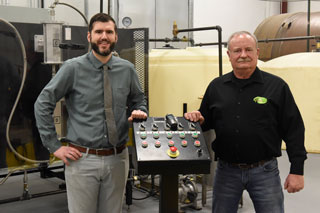Technology developed by faculty member fuels new business
Biodiesel refinery uses ultrasound and microwaves for greener processes

Imagine a working refinery that could fit in a space the size of a large house.
That’s what Chris Getty has built with his company AE Resources Inc. using technology developed by Dr. Matt Kropf, associate professor of energy science and technology at the University of Pittsburgh at Bradford.
By the end of this year, Getty hopes AE will be producing and selling biodiesel – diesel fuel made from plants – from a small refinery on the property of the Bradford Regional Airport.
Getty and Kropf, director of the American Refining Group/Harry Halloran Jr. Energy Institute at Pitt-Bradford, met about a decade ago when Kropf was nearing completion on his doctorate in engineering science at The Penn State University.
Getty had left a job in nuclear physics, where he worked in decontamination and remediation, and was working with microwaves in a private venture associated with Carnegie Mellon University. He came across Kropf at a conference presenting a poster related to his doctoral research on the use of ultrasound and microwaves for industrial purposes.
Getty recalls that Kropf thought he wouldn’t understand his research – no one at this conference had yet. But with his background in the use of microwaves, Getty more than understood it, he saw potential in it – enough that he convinced the company he worked for to sponsor Kropf’s doctoral research.
Getty believed in Kropf’s research so much that he created a company to make it a reality on an industrial scale.
“I jumped in with both feet,” Getty said. “I recognize the potential impact it has. The technology has potential in any (chemical) reaction and could be of great value to a multitude of industries.”
A decade later, the idea is becoming a reality at the airport, where AE has a full biodiesel refinery set up in an industrial incubator in the airport’s Keystone Opportunity Zone. The zone allows incubator tenants to forgo paying local taxes for a limited time.
Kropf serves as the chief technical officer for AE Resources and is working on adjusting and calibrating the plant’s instruments between classes at Pitt-Bradford, where he teaches energy science and technology.
The ultrasound and microwave technology developed by Kropf has allowed Getty to build a biodiesel refinery that can produce between 3 and 5 million gallons of fuel annually in a 3,000-square-foot space. The heart of the refinery – ultrasound and microwave units – would fit in the average dining room.
“It’s the new refinery of tomorrow, and it reduces so much risk,” Getty said. “There’s no steam. No stacks. This will produce almost zero emissions.”
In a standard biodiesel refining process, plant-based oil, such as soybean, corn, or even used cooking oil, is mixed with methanol in a large tank, then heated to create fuel.
The AE Resources process mixes the ingredients by ultrasound (high-frequency sound waves), creating an even distribution of each ingredient throughout. The device used to do the mixing looks like a slight widening in a pipe and processes 30 gallons per minute.
With a finer and more even distribution of droplets throughout the mixture, less heat is needed to create fuel. Instead of heating a large tank of the mixture with steam, it continues through pipes and passes through microwave units. The microwave units are far more efficient than traditional boiling. Getty said that with this method, AE produces biofuel using 80 percent less energy and 65 percent less catalyst than traditional methods. The technology does that by creating an instantaneous reaction that increases output.
With Kropf’s patented technology and Getty’s business acumen, all that was needed to get AE resources off the ground was some luck. That came in the form of a grant from Ben Franklin Technology Partners, a state initiative that invests in innovative start-up companies.
As a condition of the grant, AE’s plant had to locate in a rural area, and Sherri Geary of the McKean County Industrial Authority had just the place at the airport. In late 2018, another lucky piece fell into place when Getty found out about a failed biodiesel plant in Kane that had its tanks and other equipment up for sale.
“All the dots were lined up,” Getty said, the grant, the space that was close to where Kropf was working and teaching, the KOZ that would allow the start-up to receive certain tax reductions for its first two years, and most of all – the patented technology, which can make the venture profitable.
“There’s no other technology like this out there,” Getty said. He’s confident that AE has several products – biofuel, glycerin (a co-product from the process that is used in lotions and cosmetics), and the technology itself.
Getty sees the plant at the airport not only making biofuel, but also selling the ultrasound and microwave units to any industry that wants to take advantage of using less energy and chemicals.
The biofuel can be mixed with standard diesel fuel to improve its lubricating properties and preserve expensive diesel engines. Getty explained that Pennsylvania state law passed during Gov. Ed Rendell’s administration requires diesel fuel to be blended with biodiesel.
Lastly, the plant can help create environmental researchers of the future. Getty and Kropf see opportunities for Kropf’s students to perform hands-on research at the plant involving ultrasound, microwaves and chemistry.
Currently, Kropf and Getty are fine-tuning the plant to meet quality standards. Getty said he will be selling biofuel within the year. He plans to purchase his base soybean oil from regional sources, including a soybean crush facility outside of Conneaut, and grow from one and a half employees (in addition to himself and Kropf) to two per shift for three shifts.